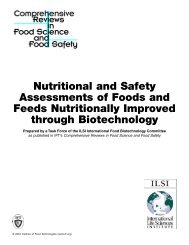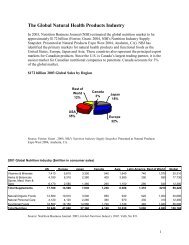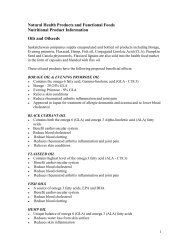Beyond Borders: Global biotechnology report 2010
Beyond Borders: Global biotechnology report 2010
Beyond Borders: Global biotechnology report 2010
Create successful ePaper yourself
Turn your PDF publications into a flip-book with our unique Google optimized e-Paper software.
Roe: I am in agreement that sustaining and enduring government<br />
policy is a critical accelerator here, and certainly we’ve seen<br />
evidence of that in Brazil, without question. We can question<br />
whether or not we’ve seen that in the United States yet. In fact,<br />
I would posit that we have not. Thirty-five or so years after the<br />
declaration that we have to become energy independent, we<br />
still don’t have an enduring energy policy in this country. Every<br />
administration, Democrat or Republican, has failed to follow<br />
through on its promises.<br />
So I agree with Ollie in that regard. I would say further that<br />
from the standpoint of a true accelerator, independent of the<br />
molecule, independent of the fuel type, whether it’s ethanol or<br />
the so-called drop-in type fuels, I think a terrific accelerator would<br />
be investment tax credits (ITCs). We’ve seen this in other areas<br />
of the cleantech space, the clean energy space. We’ve seen ITCs<br />
successfully employed in wind and solar. But we have yet to see<br />
the same mechanism employed in biofuels, and I think it would<br />
be not only an acceptable, but almost necessary early incentive.<br />
Then, I would also agree with Ollie, that these incentives ultimately<br />
have to go away again.<br />
Forer: What are some of the solutions to scaling up biofuels?<br />
Mace: Again, it’s this notion of partnerships — recognizing<br />
complementary skills and recognizing what specific partners are<br />
good at. People who are good at developing technologies and who<br />
are at the forefront of bioscience, for example, but may not have<br />
the track record or the bench strength to really do the scaling up of<br />
their process, meeting halfway with the people who are less high-<br />
tech but have more of a track record of delivering big projects at<br />
scale consistently, who have the know-how and the processes.<br />
Roe: I would agree with that, and I would also say that there<br />
probably is some room here for true finance innovation. I don’t<br />
know if it can be actualized or if we’ll ever see this in the foreseeable<br />
future, but something as novel or as new as a green bank scenario<br />
that’s been proposed, for example. One of the most difficult things<br />
to do today if you’re ready to go, if you’re ready to get a project of<br />
size up and running or up and constructed, is just the acquisition of<br />
even conventional project debt, where lenders today are perhaps<br />
rightfully gun-shy about taking chances on big projects with first-ofa-kind<br />
technologies.<br />
It would be a huge undertaking. It’s unclear whether the climate<br />
today would be conducive to such a concept. But it would be a<br />
manifestation of what we talked about earlier in terms of the need<br />
for enduring government policy and a stake in the ground that says<br />
if it takes us 20 to 30 years to get there, we have to start now and<br />
we have to have structures in place, including innovative financing<br />
structures, that will allow this to happen.<br />
Haywood: We’ve linked synthetic biology with industrial biology.<br />
When I say that, the magic is really in the synthetic part, what we do<br />
inside the host organism. But the other piece is equally important;<br />
the industrial biology actually allows you to scale up, and that’s<br />
really fermentation. Fermentation is not a new science. It’s been<br />
around since the Phoenicians used it to make alcohols. Thus, the<br />
technology is actually older than oil and gas refining and it’s very<br />
sophisticated. The Brazilians have used it effectively to make<br />
ethanol. And also in the US, we’re now making a lot of ethanol using<br />
fermentation, and I think that’s one of the better technologies to<br />
be able to tap into to produce at the scale that we’re talking about.<br />
We didn’t invent it; we’re just using it. And it’s very effective. It has<br />
a history of being reliable and productive, and it goes on at pretty<br />
much ambient temperatures and pressures, so it doesn’t require a<br />
lot of exotic equipment. This keeps the capital costs relatively low.<br />
I think the other issue is on the feedstock side. That’s really<br />
unlocking the technology that allows you to convert biomass to<br />
sugars. There are a lot of technologies that use sugars, as LS9<br />
does, to create biofuels. Once you produce sugars from biomass,<br />
you now move the geographies out of just the cane areas to<br />
almost everywhere you can grow cellulosic materials. You can use<br />
switchgrass, wood chips, corn stover and waste products to create<br />
sugars. I think when that happens, it will be a huge breakthrough in<br />
terms of the scaling capabilities of a lot of these technologies.<br />
Bandak: I’m starting to see non-traditional pools of capital being<br />
attracted to this space. They may come from traditional parties,<br />
such as sovereign wealth and private equity funds, or potentially<br />
“Biofuels are clearly a big part of the<br />
response and, as a matter of fact, they are<br />
among the very few credible solutions in<br />
the area of transport … Our vision is that<br />
biofuels have the potential to be between<br />
10% and 20% of global transport fuel<br />
energy by 2030.”<br />
101








